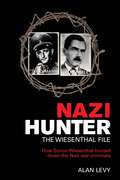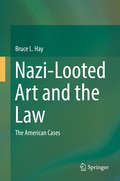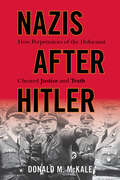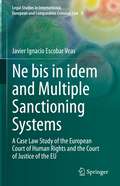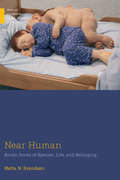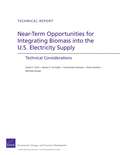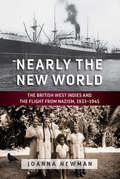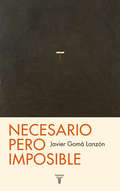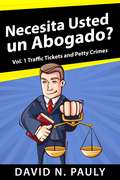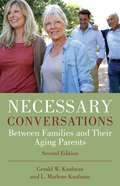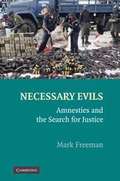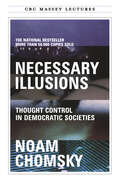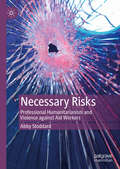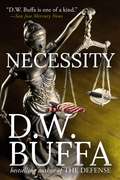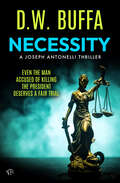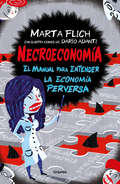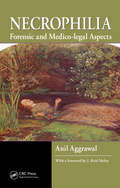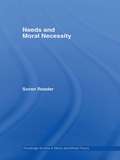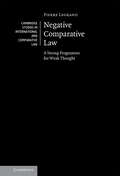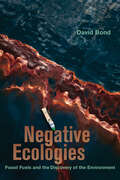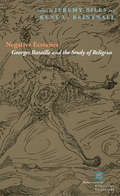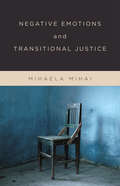- Table View
- List View
Nazi Hunter: The Wiesenthal File
by Alan LevySimon Wiesenthal spent four and a half years in Mauthausen concentration camp during World War II. With the exception of his wife, all his immediate family were exterminated, and he himself ended the war a living skeleton. Since then, he has achieved international reknown for his tireless and successful tracking down of Nazi war criminals, including notorious figures such as Eichmann, the 'desk murderer' who masterminded Hitler's Final Solution; Stangl the overlord of Treblinka; and the Mengele of Auschwitz, the dreaded 'Angel of Death'. To this day his work continues, his motivation simply expressed in the words: 'Justice, not vengeance'. This work provides an account of Wiesenthal's inspired detective work.
Nazi War Crimes, US Intelligence and Selective Prosecution at Nuremberg: Controversies Regarding the Role of the Office of Strategic Services
by Michael SalterReviewing recently declassified CIA documents, this book provides a balanced but critical discussion of the contribution of American intelligence officials to the Nuremberg war crimes trials. Giving new details of how senior Nazi war criminals, such as SS General Karl Wolff, were provided with effective immunity deals, partly as a reward for their wartime cooperation with US intelligence officials, including Allen Dulles, former CIA Director, the author also discusses the role of such officials in mobilizing the unique resources of a modern intelligence agency to provide important trial testimony and vital documentary evidence. Nazi War Crimes, US Intelligence and Selective Prosecution at Nuremberg argues that both war crimes prosecutors and intelligence officials can engage in mutually beneficial collaborations, but that both sides need to recognize and appreciate the problems that may arise from the fact that these institutions are required to operate according to different, and in some cases contradictory, agendas. This topical book gives those studying, or with interests in, international law, criminal law and history an insight into the debates surrounding international war crimes, within the context of the Nuremberg war crimes trials.
Nazi-Looted Art and the Law
by Bruce L. HayThis book offers a clear, accessible account of the American litigation over the restitution of works of art taken from Jewish families during the Holocaust. For the past two decades, the courts of the United States have been an arena of conflict over this issue that has recently captured widespread public attention. In a series of cases, survivors and heirs have come forward to claim artworks in public and private collections around the world, asserting that they were seized by the Nazis or were sold under duress by owners desperate to escape occupied countries. Spanning two continents and three-quarters of a century, the cases confront the courts with complex problems of domestic and international law, clashes among the laws of different jurisdictions, factual uncertainties about the movements of art during and after the war, and the persistent question whether restitution claims have been extinguished by the passage of time.Through individual case studies, the book examines the legal questions these conflicts have raised and the answers the courts have given. From the internationally celebrated “Woman in Gold” lawsuit against Austria to lesser-known claims against Germany, Hungary, Spain, and museums and private collections in the United States, the book synthesizes the legal and evidentiary materials and judicial rulings in each case, creating a coherent narrative of proceedings that are often labyrinthine in complexity. Written by a leading authority on litigation and procedure, the book will be of interest to readers in various fields of the humanities and social sciences as well as law, and to anyone interested in the fate of artworks that have been called the “last prisoners” of the Second World War.
Nazis after Hitler: How Perpetrators of the Holocaust Cheated Justice and Truth
by Donald M McKaleThe stories of thirty war criminals who escaped accountability, from a historian praised for his &“well written, scrupulously researched&” work (The New York Times). This deeply researched book traces the biographies of thirty &“typical&” perpetrators of the Holocaust—some well-known, some obscure—who survived World War II. Donald M. McKale reveals the shocking reality that the perpetrators were rarely, if ever, tried or punished for their crimes, and nearly all alleged their innocence in Germany&’s extermination of nearly six million European Jews. He highlights the bitter contrasts between the comfortable postwar lives of many war criminals and the enduring suffering of their victims, and how, in the face of exhaustive evidence showing their culpability, nearly all claimed ignorance of what was going on—and insisted they had done nothing wrong. &“McKale ends the book with a haunting question: whether life would be different today if the Allies had pursued Holocaust criminals more aggressively after WWII. History buffs and students of the Holocaust will be fascinated.&” ―Publishers Weekly &“Gripping and important reading.&” —Eric A. Johnson, author of What We Knew
Ne Bis in Idem in EU Law
by Van Bockel BasQuestions of the application and interpretation of the ne bis in idem principle in EU law continue to surface in the case law of different European courts. The primary purpose of this book is to provide guidance and to address important issues in connection with the ne bis in idem principle in EU law. The development of the ne bis in idem principle in the EU legal order illustrate the difficulty of reconciling pluralism with the need for doctrinal coherence, and highlights the tensions between the requirements of effectiveness and the protection of fundamental rights in EU law. The ne bis in idem principle is a 'litmus test' of fundamental rights protection in the EU. This book explores the principle, and the way the Court of Justice of the European Union has interpreted it, in the context of competition law and the areas of freedom, security and justice, human rights law and tax law.
Ne bis in idem and Multiple Sanctioning Systems: A Case Law Study of the European Court of Human Rights and the Court of Justice of the EU (Legal Studies in International, European and Comparative Criminal Law #8)
by Javier Ignacio Escobar VeasThe aim of the book is to resolve the question of whether multiple sanctioning systems are contrary to the ne bis in idem under the regulation provided by Protocol 7 to the ECHR and the EU Charter of Fundamental Rights. The first part is a comparative study regarding the lawfulness of multiple sanctioning systems under the ne bis in idem, studying the evolution and the current state of the case law of the United States Supreme Court, the Canadian Supreme Court, the Spanish Constitutional Court, the European Court of Human Rights (ECtHR) and the Court of Justice of the European Union (CJEU). The second part of the book critically analyses three problems with the case law of the ECtHR and the CJEU. Part three deals with reconceptualizing the prohibition of multiple punishment and the prohibition of multiple prosecutions. Finally, the fourth part addresses other possible protections against multiple sanctioning systems. Two other safeguards that limit multiple sanctioning systems are the prohibition of disproportionate sanctions and the right to be tried within a reasonable time.
Near Human: Border Zones of Species, Life, and Belonging (Medical Anthropology)
by Mette N. SvendsenNear Human takes us into the borders of human and animal life. In the animal facility, fragile piglets substitute for humans who cannot be experimented on. In the neonatal intensive care unit, extremely premature infants prompt questions about whether they are too fragile to save or, if they survive, whether they will face a life of severe disability. Drawing on ethnographic fieldwork carried out on farms, in animal-based experimental science labs, and in hospitals, Mette N. Svendsen shows that practices of substitution redirect the question of "what it means" to be human to "what it takes" to be human. The near humanness of preterm infants and research piglets becomes an avenue to unravel how neonatal life is imagined, how societal belonging is evaluated, and how the Danish welfare state is forged. This courageous multi-sited and multi-species approach cracks open the complex ethical field of valuating life and making different kinds of pigs and different kinds of humans belong in Denmark.
Near-Term Opportunities for Integrating Biomass into the U.S. Electricity Supply
by David S. Ortiz Nicholas Burger Constantine Samaras Aimee E. Curtright Aviva LitovitzBiomass is an increasingly important source of electricity, heat, and liquid fuel. One near-term option for using biomass to generate electricity is to cofire biomass in coal-fired electricity plants. This report focuses on two aspects of biomass use: plant-site modifications, changes in operations, and costs associated with cofiring biomass; and the logistical issues associated with delivering biomass to the plant.
Nearly the New World: The British West Indies and the Flight from Nazism, 1933–1945
by Joanna NewmanIn the years leading up to the Second World War, increasingly desperate European Jews looked to far-flung destinations such as Barbados, Trinidad, and Jamaica in search of refuge from the horrors of Hitler’s Europe. Nearly the New World tells the extraordinary story of Jewish refugees who overcame persecution and sought safety in the West Indies from the 1930s through the end of the war. At the same time, it gives an unsparing account of the xenophobia and bureaucratic infighting that nearly prevented their rescue—and that helped to seal the fate of countless other European Jews for whom escape was never an option.
Nebraska Driver's Manual
by Nebraska Department of Motor VehiclesDriver safety depends on education. In 2014, Nebraska had one driving-related crash every 16 minutes. With the proper education and attention to safety, everyone using the road can arrive safely at our destinations. To achieve the goal of reducing vehicle crashes, each of us must dedicate our individual attention to the rules of the road when driving. Remember, people on bicycles and pedestrians are also depending on your attention to safety behind the wheel. Understanding the information in this manual is an important first step.
Necesario pero imposible: O ¿qué podemos esperar? (Tetralogía de la ejemplaridad #Volumen)
by Javier Gomá LanzónEste libro recupera para la filosofía la cuestión de la esperanza, y emprende la tarea de hacer creíble una supervivencia más allá de la muerte. En continuidad con Aquiles en el gineceo, que estudia cómo ser individual en este mundo, Necesario pero imposible reflexiona sobre la posibilidad de seguir siéndolo fuera de él. Recupera así la cuestión de la esperanza en una supervivencia personal, abandonada por la filosofía desde Kant. Con el objetivo de «civilizar el infinito», este libro establece las condiciones bajo las cuales sería razonable para un yo moderno -dotado de dignidad infinita pero abocado a la indignidad de la muerte- pensar en esa continuidad post mórtem de lo humano, que no sería nunca una inmortalidad del alma sino una mortalidad prorrogada. Recurre al precedente canónico de esta hipótesis, el profeta de Galilea muerto y resucitado según sus seguidores y a quien éstos recordaron como un modelo de ejemplaridad perfecta. Cada uno de los títulos de esta tetralogía es autónomo y de lectura independiente y al mismo tiempo los cuatro forman parte de un plan unitario en torno a la idea de ejemplaridad: su historia y su teoría general (Imitación y experiencia), su formación subjetiva (Aquiles en el gineceo), su aplicación a la esfera política (Ejemplaridad pública) y su relación con la esperanza (Necesario pero imposible). Esta edición culmina un plan literario-filosófico muy antiguo y largamente cultivado por el autor. Reseñas: «Una extraordinaria reflexión sobre la esperanza.» Pedro G. Cuartango, El Mundo «Un gran ensayo filosófico y un ejercicio literario deslumbrante.» Jon Juaristi, ABC «Javier Gomá medita sobre un tiempo geológico -el filosófico- sin renunciar a observar urgencias del presente. Se apropia de conceptos caídos en desuso y los rellena con savia nueva.» Tereixa Constela, El País «Un hombre cuya formación lo convierte en una espléndida rareza dentro del ámbito del nuevo pensamiento español.» ABC «Javier Gomá se ha convertido con todo merecimiento en una destacada figura del panorama intelectual español.» El Cultural «Un pensador en alza.» El Mundo «El filósofo Javier Gomá es el pensador de moda.» Babelia Reseñas:«Una extraordinaria reflexión sobre la esperanza.»Pedro G. Cuartango, El Mundo «Un gran ensayo filosófico y un ejercicio literario deslumbrante.»Jon Juaristi, ABC «Javier Gomá medita sobre un tiempo geológico -el filosófico- sin renunciar a observar urgencias del presente. Se apropia de conceptos caídos en desuso y los rellena con savia nueva.»Tereixa Constela, El País «Un hombre cuya formación lo convierte en una espléndida rareza dentro del ámbito del nuevo pensamiento español.»ABC «Javier Gomá se ha convertido con todo merecimiento en una destacada figura del panorama intelectual español.»El Cultural «Un pensador en alza.»El Mundo «El filósofo Javier Gomá es el pensador de moda.»Babelia
Necesita Usted un Abogado?
by David N. PaulyEste es un .ibro que trata de como un abogado contratado a tiempo puede ahorrarle mucho dinero y describe los casos más comunes de delitos menores.
Necessary Conversations: Between Families and Their Aging Parents
by Gerald Kaufman L. Marlene KaufmanIn this timely book, long-time family counselors, Gerald and Marlene Kaufman, urge aging people, their adult children, family members, and other caretakers to talk directly with each other about the decisions that lie ahead as they age. "Do it before a crisis hits," say the Kaufmans. "A good time to start is when the parents retire."Necessary Conversations focuses on four primary areas:Parents' finances Parents' medical care Parents' living arrangements When to stop driving This honest and resourceful guide for aging adults and their family members includes helpful suggestions for starting these conversations and overcoming confrontation.
Necessary Evils
by Mark FreemanThis book is about amnesties for grave international crimes that are adopted by states in moments of transition or social unrest. The subject is naturally controversial, especially in the age of the International Criminal Court. The goal of this book is to reframe and revitalize the global debate on the subject, and to offer an original framework for resolving amnesty dilemmas when they arise. Most existing literature and jurisprudence on amnesties deal with only a small subset of state practice and sidestep the ambiguity of amnesty's position under international law. This book addresses the ambiguity head on and argues that amnesties of the broadest scope are sometimes defensible when adopted as a last recourse in contexts of mass violence. Drawing on an extensive amnesty database, the book offers detailed guidance on how to ensure that amnesties extend the minimum leniency possible, while imposing the maximum accountability on the beneficiaries.
Necessary Illusions: Thought Control in Democratic Societies (The CBC Massey Lectures)
by Noam ChomskyIn his national bestselling 1988 CBC Massey Lectures, Noam Chomsky inquires into the nature of the media in a political system where the population cannot be disciplined by force and thus must be subjected to more subtle forms of ideological control. Specific cases are illustrated in detail, using the U.S. media primarily but also media in other societies. Chomsky considers how the media might be democratized (as part of the general problem of developing more democratic institutions) in order to offer citizens broader and more meaningful participation in social and political life.
Necessary Risks: Professional Humanitarianism and Violence against Aid Workers
by Abby StoddardAttacks on humanitarian aid operations are both a symptom and a weapon of modern warfare, and as armed groups increasingly target aid workers for violence, relief operations are curtailed in places where civilians are most in need. This book provides an in-depth analysis of the challenges to humanitarian action in warzones, the risk management and negotiation strategies that hold the most promise for aid organizations, and an ethical framework from which to tackle the problem. By combining rigorous research findings with structural historical analysis and first-person accounts of armed attacks on aid workers, the author proposes a reframed ethos of humanitarian professionalism, decoupled from organizational or political interests, and centered on optimizing outcomes for the people it serves.
Necessity
by D. W. BuffaThe riveting new thriller from bestselling Edgar Award nominee D.W. Buffa! <P><P> It was a strange case, a great case, a case that, once it got to trial, might well change forever the history of the United States. Other presidents had been murdered, but no one who had killed a president had ever been brought to trial. I did not want any part of it. <P><P> NECESSITY is the riveting new thriller from bestselling Edgar Award nominee D.W. Buffa in which criminal defense attorney Joseph Antonelli finds himself embroiled in the most controversial and explosive trial in American history, representing the man accused of murdering the President. When renowned lawyer Joseph Antonelli--the defense attorney who has never lost a case--takes on the most shocking and controversial case of his storied career, he has no idea of the depths of trouble he's about to get into. A man has murdered the President of the United States, but has invoked the "Law of Necessity," which states that a crime is justified if it serves the greater good and thus prevents a greater harm from occurring. <P><P>As the nation watches the trial of the century, Antonelli must try a case with all eyes on him...and his own life on the line. NECESSITY will enthrall half of the country and infuriate the other half. Everyone, however, will want to read it.
Necessity (The Joseph Antonelli Thrillers)
by D. W. BuffaA defense attorney faces the toughest case of his career: representing a man who has admitted to murdering the president . . . When Joseph Antonelli, who has never lost a case, takes on the most shocking client of his career, he is unprepared for the depths of trouble he&’s about to get into. A senator has confessed to stabbing the president of the United States to death—but has invoked the &“Law of Necessity,&” which states that a crime is justified if it serves the greater good. As the nation is gripped by the trial of the century, Antonelli must try a case with all eyes on him—and his own life on the line—in this riveting read from a bestselling Edgar Award nominee. &“Highly recommended for lovers of legal and political thrillers.&” ―Library Journal (starred review)Praise for D. W. Buffa &“Buffa is one of a kind.&” —San Jose Mercury News &“A whopper of a reveal.&” —Booklist
Necroeconomía: El manual para entender la economía perversa
by Marta Flich Dario AdantiMarta Flich, «la musa de la izquierda», repasa desde la ironía y el humor las claves para entender, de una vez por todas, cómo funciona la economía. Si te inquietan el gasto social y la corrupción, si te preguntas a menudo por qué sigues siendo pobre aunque trabajes ocho horas al día, o si tienes ganas de saber más de economía pero esta te parece oscura e inaccesible, este es tu libro. Marta Flich nos acerca la realidad económica para hacernos entender, por fin, los conceptos básicos que la rigen con su característico estilo irónico y mordaz. Con esta guía cualquiera podrá entender los principios elementales de la economía mundial con ejemplos del día a día que resultan cómicos y cotidianos. Es un manual que está pensado para perderle el miedo a esa información que, a veces, nos supera, y para ayudarnos a comprender a dónde van nuestros impuestos y qué papel jugamos en la sociedad, más allá de los cantos de sirena de los políticos. Y, sobre todo, Marta denuncia que hablar de economía en España es hablar hoy más que nunca de la expansión de la «necroeconomía», esa maquinaria perversa diseñada para que siempre pierda el más débil. Todo ello acompañado de las ilustraciones de Darío Adanti, renovador del cómic español y referente del humor satírico. ¿Qué es la necroeconomía? Para mí, es toda aquella utilización mercantilista y transversal que afecta a un grupo vulnerable por falta de igualdad de oportunidades. La necroeconomía no hubiera crecido tan salvajemente sin la existencia de la comunicación, principalmente a través de las redes sociales. ¿Sigues sin entenderlo? Bien, hagamos un ejercicio pedagógico acelerado. Para mí, no digo que necesariamente tenga que ser lo mismo para el resto de mis colegas, la necroeconomía es una de esas formas que adopta la economía y que, en la actualidad, está avanzando geométricamente, haciéndose un hueco en nuestros podridos corazones. La necroeconomía es todo aquello que se rentabiliza a partir del dolor, la muerte, la injusticia, la desgracia o todo a la vez. ¿Vendes camisetas con un lema feminista para sacar pasta cuando en realidad te es indiferente la igualdad? Necroeconomía. ¿Exprimes a personas con un trauma reciente rentabilizando su causa hasta agotar el interés (y la recaudación)? Necroeconomía. ¿Tergiversas la verdad para ganar dinero? Necroeconomía. ¿Montas actos donde la gente aporta pasta para luchar contra el terrorismo o el cáncer, pero nadie recibe esa ayuda salvo tu bolsillo? Necroeconomía. ¿Vas a una fundación y te dejan las joyas para que poses en un photocall? Necroeconomía. ¿Participas en actos solidarios pero tú vas a que te inviten a cenar y hacer contactos con el marqués de Bliblibli? Eres mala gente. Pero, en cualquier caso, enhorabuena, formas parte del circo.
Necrophilia: Forensic and Medico-legal Aspects
by Anil AggrawalNecrophilia: Forensic and Medico-legal Aspects is the first text that deals with the scientific aspects of necrophilia from a multidisciplinary point of view. After an introduction that provides a general scientific, social, and historical perspective, this volume:Explores causes and contributing factors, covering biological theories and genetics, as well as trauma, brain anomalies, and substance abuseOffers an original approach to classification, creating ten levels of severity from role playing to homicidal necrophiliaDiscusses necrophilia epidemiology, exploring offender characteristics and habitsProvides 20 case studies of infamous as well as less publicized casesDetails the forensics approach to necrophilia investigationExamines current legislation and mores across the worldExplains the challenges involved with providing expert testimony
Needs and Moral Necessity (Routledge Studies in Ethics and Moral Theory #Vol. 9)
by Soran ReaderNeeds and Moral Necessity analyses ethics as a practice, explains why we have three moral theory-types, consequentialism, deontology and virtue ethics, and argues for a fourth needs-based theory.
Negative Comparative Law: A Strong Programme for Weak Thought (Cambridge Studies in International and Comparative Law #167)
by Pierre LegrandWritten under the sign of Beckett, this book addresses comparative law's commitment to the deterritorialization of the legal and its attendant claim for the normative relevance of foreign law locally in the fabrication of statutory determinations, judicial opinions, or academic reflections. Wanting to withstand the law's persistent tendency towards nationalist retrenchment and counter comparative law's institutional marginalization, the fifteen essays at hand impart radical and discerning intellectual equipment in order to foster the valorization of the legally foreign and the comparative motion. In particular, the critique informing this manifesto examines pre-eminent topics like culture and difference, understanding and translatability, objectivity and truth, invention and tracing. Harnessing insights from a range of disciplinary discourses, this book contends that comparatists must boldly desist from their field's dominant epistemology and embrace a practice much better attuned to the study of foreignness.
Negative Ecologies: Fossil Fuels and the Discovery of the Environment
by David BondSo much of what we know of clean water, clean air, and now a stable climate rests on how fossil fuels first disrupted them. Negative Ecologies is a bold reappraisal of the outsized role fossil fuels have played in making the environment visible, factual, and politically operable in North America. Following stories of hydrocarbon harm that lay the groundwork for environmental science and policy, this book brings into clear focus the dialectic between the negative ecologies of fossil fuels and the ongoing discovery of the environment. Exploring iconic sites of the oil economy, ranging from leaky Caribbean refineries to deepwater oil spills, from the petrochemical fallout of plastics manufacturing to the extractive frontiers of Canada, Negative Ecologies documents the upheavals, injuries, and disasters that have long accompanied fossil fuels and the manner in which our solutions have often been less about confronting the cause than managing the effects. This history of our present promises to re-situate scholarly understandings of fossil fuels and renovate environmental critique today. David Bond challenges us to consider what forms of critical engagement may now be needed to both confront the deleterious properties of fossil fuels and envision ways of living beyond them.
Negative Ecstasies: Georges Bataille and the Study of Religion (Perspectives in Continental Philosophy)
by Jeremy Biles and Kent L. BrintnallDespite Georges Bataille’s acknowledged influence on major poststructuralist thinkers—including Foucault, Derrida, Kristeva, Lacan, Baudrillard, and Barthes—and his prominence in literary, cultural, and social theory, rarely has he been taken up by scholars of religion, even as issues of the sacred were central to his thinking. Bringing together established scholars and emerging voices, Negative Ecstasies engages Bataille from the perspective of religious studies and theology, forging links with feminist and queer theory, economics, secularism, psychoanalysis, fat studies, and ethics. As these essays demonstrate, Bataille’s work bears significance to contemporary questions in the academy and vital issues in the world. We continue to ignore him at our peril.
Negative Emotions and Transitional Justice
by Mihaela MihaiVehement resentment and indignation are pervasive in societies emerging from dictatorship or civil conflict. How can institutions channel these emotions without undermining the prospects for democracy? Emphasizing the need to recognize and constructively engage negative public emotions, Mihaela Mihai contributes theoretically and practically to the growing field of transitional justice. Drawing on an extensive philosophical literature and case studies of democratic transitions in South Africa, South America, and Eastern Europe, her book rescues negative emotions from their bad reputation and highlights the obstacles and the opportunities such emotions create for democracy. By valorizing negative emotions, either through the judicial review of transitional justice bills or the criminal trials of victimizers, institutions realize the value of respect and concern for all while contributing to a culture that is hospitable to democracy.
